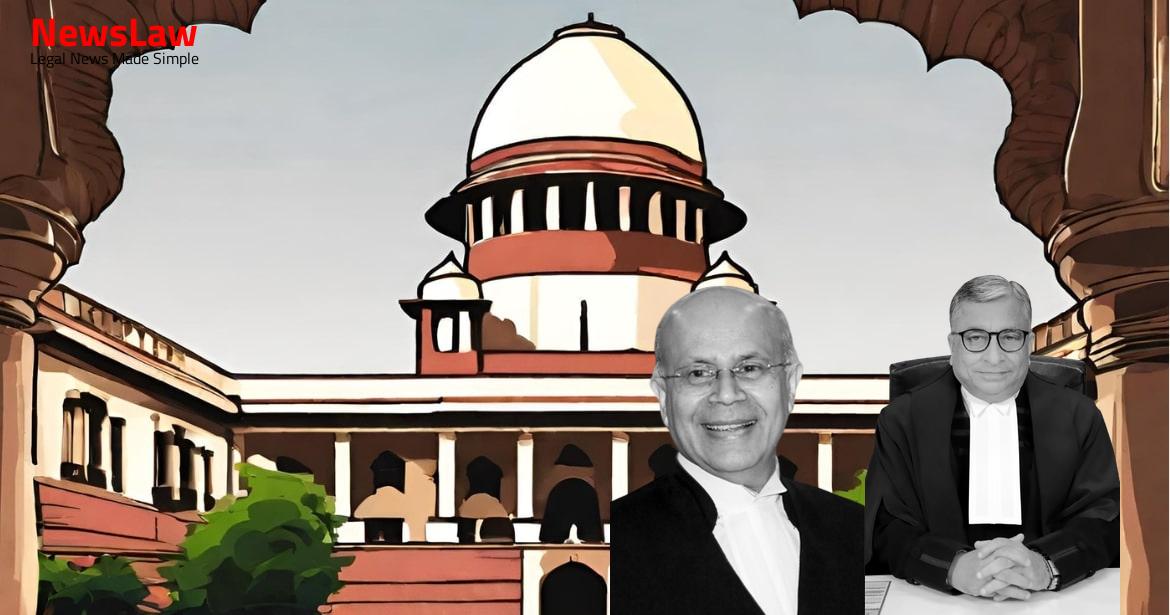Explore the intriguing legal analysis of a recent court case that delves into the application of the notional extension theory in the context of employment law. Discover how the court’s interpretation and application of this theory played a crucial role in determining compensation for the deceased worker’s legal heirs. Stay tuned to understand the significance of advancing the purpose of legislation and ensuring fair treatment for workers.
Facts
- The deceased, a 21-year-old employee of respondent no.2, was driving a TATA 407 vehicle from Ambala to Meerut on 11.06.2003.
- While approaching a bridge near village Fatehpur, he went to the Yamuna canal to fetch water and bathe around 12.30 PM.
- He slipped into the canal and unfortunately died, with a cleaner also trying to save him but also slipping in.
- The Workmen’s Compensation Commissioner granted compensation to the deceased’s legal heirs, with interest and a penalty on the employer.
- The High Court, in an appeal by the Insurance Company, noted that while death occurred during employment, it did not arise out of employment as bathing was not incidental to the work.
Also Read: Analysis of Intent in Fatal Assault Case
Arguments
- Mr. Vikas Bhadana argued that there was a causal connection between the death and the employment.
- He relied on the case of Leela Bai vs. Seema Chouhan to support his argument.
- Mr. Ajay Singh, representing the respondent, contended that the High Court rightly found no causal connection.
- The extreme heat in June and the circumstances suggested that the deceased went to fetch water for the truck and himself, linking it to his employment.
- It was emphasized that mere occurrence of death during employment is not enough; it must be shown to be incidental and arising out of the employment.
Also Read: Assessment of Compensation in Disability Case
Analysis
- In the case of B.E.S.T. Undertaking vs Agnes, AIR 1964 SC 193, it was held that the injury must be caused to the workman by an accident arising out of and in the course of his employment.
- The employment does not necessarily end when the ‘down tool’ signal is given or when the workman leaves the actual workshop. It can be extended by time and space.
- The provisions of the law must be interpreted to advance the purpose of the legislation.
- Entry and exit points in employment can have a notional extension by time and space, depending on the circumstances of each case.
- In the Daya Kishan Joshi case, it was held that being on the road for work-related purposes falls within the course of employment.
- The employer is liable to pay compensation if personal injury is caused to a workman by accident arising out of and in the course of his employment.
- In the Manju Sarkar case, it was established that the deceased was in the course of his employment, similar to the situation in Malikarjuna G. Hiremath case.
- Application of the notional extension theory of employment in the context of truck drivers ensuring safety during their journey is essential.
- In the present case, the accident had a clear connection to the employment of the deceased driver, warranting the application of the notional extension theory.
- The deceased driver’s actions of staying back with the bus to ensure timely service and fetching water for the truck were deemed incidental to his employment.
- The Workmen’s Compensation Act is a crucial piece of legislation that aims to benefit workers.
- The deceased’s presence at the bus terminal after work hours was due to the requirements of his duties to maintain service efficiency.
- Considering the extreme temperatures and non-air conditioned cabin of the truck, the necessity for the deceased driver to stay fresh and alert was highlighted.
- The deceased’s actions of ensuring the efficiency of the bus service and protecting the truck were deemed essential to his employment.
- The appellant’s argument that the deceased would not go home for weeks should not be considered as a reason to deny compensation.
- Merely coming down the roof of the bus after a meal should not be isolated and interpreted myopically to conclude that he was off duty.
- The theory of notional extension should apply in the present case.
- The case of Malikarjuna is distinguishable as the deceased in that case had completed his journey before the incident.
- The High Court’s order is found to be unsustainable in this context.
Also Read: Legal Analysis on Charge-sheet Issuance and Dismissal
Decision
- Respondent no.2 has been deleted, therefore, the question of her paying the penalty does not arise.
- The order of the Workmen’s Compensation Commissioner dated 12.12.2005 has been reinstated.
- The appeal has been allowed.
- Payments as per the Workmen’s Compensation Commissioner’s order are to be made to the appellants within six weeks from today.
Case Title: POONAM DEVI Vs. ORIENTAL INSURANCE CO. LTD. (2020 INSC 291)
Case Number: C.A. No.-001836-001836 / 2020



